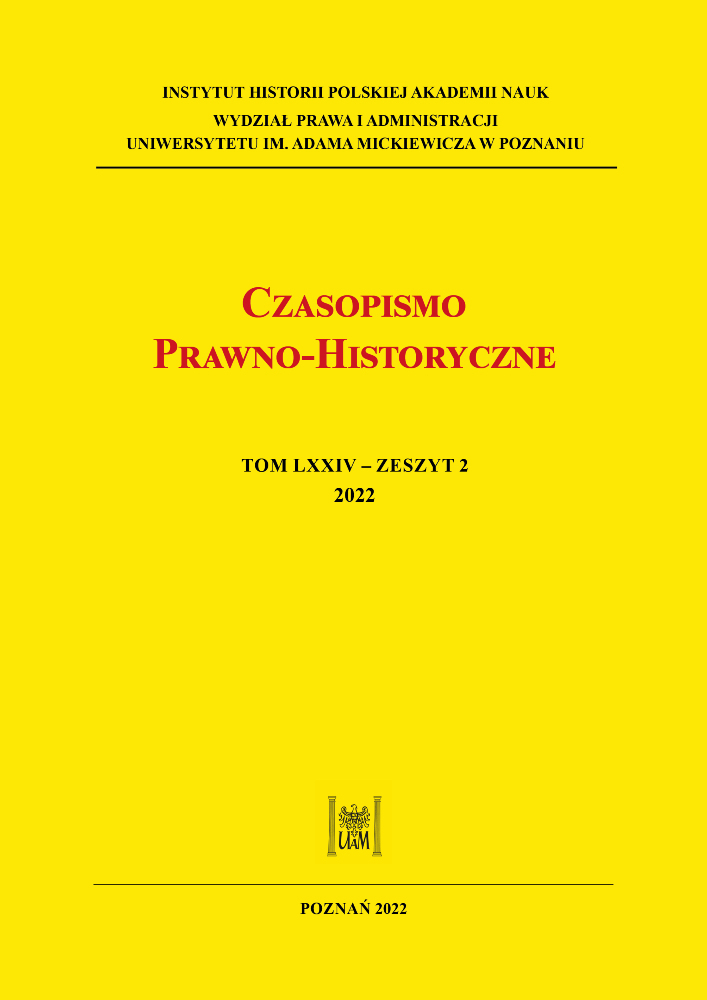Abstract
Until this very day, the theoretical intentions of William Blackstone, the author of the crucial work for the common law system, namely “The Commentaries on the Laws of England,” arouse disputes, while the author himself is perceived as one of the precursors of legal positivism as well as one of the representatives of the traditional law of nature. In the Introduction to the Commentaries, there are elements which are characteristic of both these ways of thinking about law. In the present paper, the author attempts to prove that Blackstone’s legal lecture concerning the law of nature is not only ornamental in character, which was typical of his contemporaries, but it constitutes a significant element of his legal doctrine, which also has certain consequences. According to Blackstone, natural law affects positive law in the following manner: 1. it gives us the notion of subjective rights as the structure to understand and interpret law, 2. when statutory law violates natural law, both systems remain separate and binding, thus a person is obliged to violate the positive law and simultaneously accept the sanctions imposed by the state; 3. the legislature, even though it formally remains unlimited in its legislative power in accordance with the principle of parliamentary sovereignty, is obliged to protect and strengthen the innate and absolute rights of individuals, which is an interpretative guideline for those who apply the law. Blackstone’s views are also inspiring today, because they show that natural law considerations can go beyond the rule of lex iniusta non est lex, and instead rather focus on defining the aims of the legislature and they thus constitute an element of legal interpretation.
References
Allen J., Law and Artifice in Blackstone’s Commentaries, „Journal of Law” 2014, nr 15.
Alschuler A. W., Rediscovering Blackstone, „University of Pennsylvania Law Review” 1996, t. 145, nr 1. https://doi.org/10.2307/3312712 DOI: https://doi.org/10.2307/3312712
Arystoteles, Polityka, tłum. L. Piotrowicz, Warszawa 1964.
Bentham J., A Comment on the Commentaries and A fragment on government, red. J. H. Burns, H. L. A. Hart, London 1997.
Bentham J., A Fragment on Government, wyd. F. C. Montague, Oxford 1891.
Blackstone W., An Analysis of the Laws of England, Oxford 1771.
Blackstone W., Commentaries on the Laws of England. Book the first, Oxford 1783.
Blackstone W., Commentaries on the Laws of England. Book the second, Oxford 1783.
Blackstone W., Commentaries on the Laws of England. Book the fourth, Oxford 1783.
Bracton H., De legibus et consuetudinibus Angliae, New Haven 1922.
Cyceron, O Prawach, tłum. I. Żółtowska, Kęty 1999.
Finnis J. M., Blackstone's Theoretical Intentions, „Natural Law Forum” 1967, t. 12. https://doi.org/10.1093/ajj/12.1.163 DOI: https://doi.org/10.1093/ajj/12.1.163
Hart H. L. A., Blackstone’s Use of the Law of Nature, „Butterworths South African Law Review” 1956.
Hobbes T., Lewiatan czyli materia, forma i władza państwa kościelnego i świeckiego, tłum. C. Znamierowski, Warszawa 2009.
Holdsworth W. S., Some Aspects of Blackstone and His Commentaries, „The Cambridge Law Journal” 1932, t. 4, nr 3. https://doi.org/10.1017/S0008197300131927 DOI: https://doi.org/10.1017/S0008197300131927
Instytucje Justyniana, tłum. C. Kunderowicz, Warszawa 1986.
Kaczmarczyk M., Nieposłuszeństwo obywatelskie a pojęcie prawa, Warszawa 2010.
Kelly J. M., Historia zachodniej teorii prawa, Kraków 2006.
Kennedy D., The structures of Blackstone’s Commentaries, „Buffalo Law Review” 1979, t. 28.
Lobban M., Blackstone and the Science of Law, „The Historical Journal” 1987, t. 30, nr 2. https://doi.org/10.1017/S0018246X00021464 DOI: https://doi.org/10.1017/S0018246X00021464
Locke J., Dwa traktaty o rządzie, tłum. Z. Rau, Warszawa 1992.
Lubert H. L., Sovereignty and Liberty in William Blackstone’s Commentaries on the Laws of England, „Review of Politics” 2010, t. 72, nr 2. https://doi.org/10.1017/S0034670510000057 DOI: https://doi.org/10.1017/S0034670510000057
Lucas P., Ex parte Sir William Blackstone „Plagiarist”: A note on Blackstone and Natural Law, „American Journal of Legal History” 1963, t. 7. https://doi.org/10.2307/844252 DOI: https://doi.org/10.2307/844252
Maciejewski M., Doktrynalne ujęcia relacji prawo naturalne – prawo stanowione od starożytności do czasów oświecenia, „Krakowskie Studia z Historii Państwa i Prawa” 2015, t. 8(2).
Maciejewski M., Odniesienia między prawem naturalnym i prawem stanowionym w wybranych doktrynach filozoficznych, politycznych i prawnych [w:] P. Kaczmarek, Ł. Machaj (red.), Pozytywizm prawniczy i szkoła prawa natury – tradycje sporu i jego współczesne implikacje, Wrocław 2010.
Maciejewski M., The relationship between natural and statutory law in ancient and medieval concepts, „Politeja” 2017, nr 48.
Milgate M., Human Rights and Natural Law: From Bracton to Blackstone, „Legal History” 2006, t. 10.
Monteskiusz, O Duchu praw, t. 1, tłum. T. Boy-Żeleński, Warszawa 1957.
Pufendorf S., The Law of Nature and Nations, or General System of the Most Important Principles of Morality, Jurisprudence, and Politics in Eight Books, tłum. B. Kennet, London 1749.
Ramsay H., William Blackstone’s Natural Law, „Bulletin of the Australian Society of Legal Philosophy” 1995, t. 20.
Tokarczyk R., Klasycy praw natury, Lublin 1988.
Tomasz z Akwinu, Suma Teologiczna, tłum. P. Bełch O.P., London 1986.
Strauss L., Prawo naturalne w świetle historii, Warszawa 1969.
Williams B., Ethics and the limits of philosophy, Abingdon 2006. https://doi.org/10.4324/9780203969847 DOI: https://doi.org/10.4324/9780203969847
Willman R., Blackstone and the 'Theoretical Perfection' of English Law in the Reign of Charles II, „The Historical Journal” 1983, t. 26, nr 1. https://doi.org/10.1017/S0018246X00019592 DOI: https://doi.org/10.1017/S0018246X00019592
Wood T., Some Thoughts Concerning the Study of the Laws of England, London 1727.
Zajadło J., Studia Grotiana, Gdańsk 2004.
License
Copyright (c) 2022 Dariusz Łysak

This work is licensed under a Creative Commons Attribution-ShareAlike 4.0 International License.





